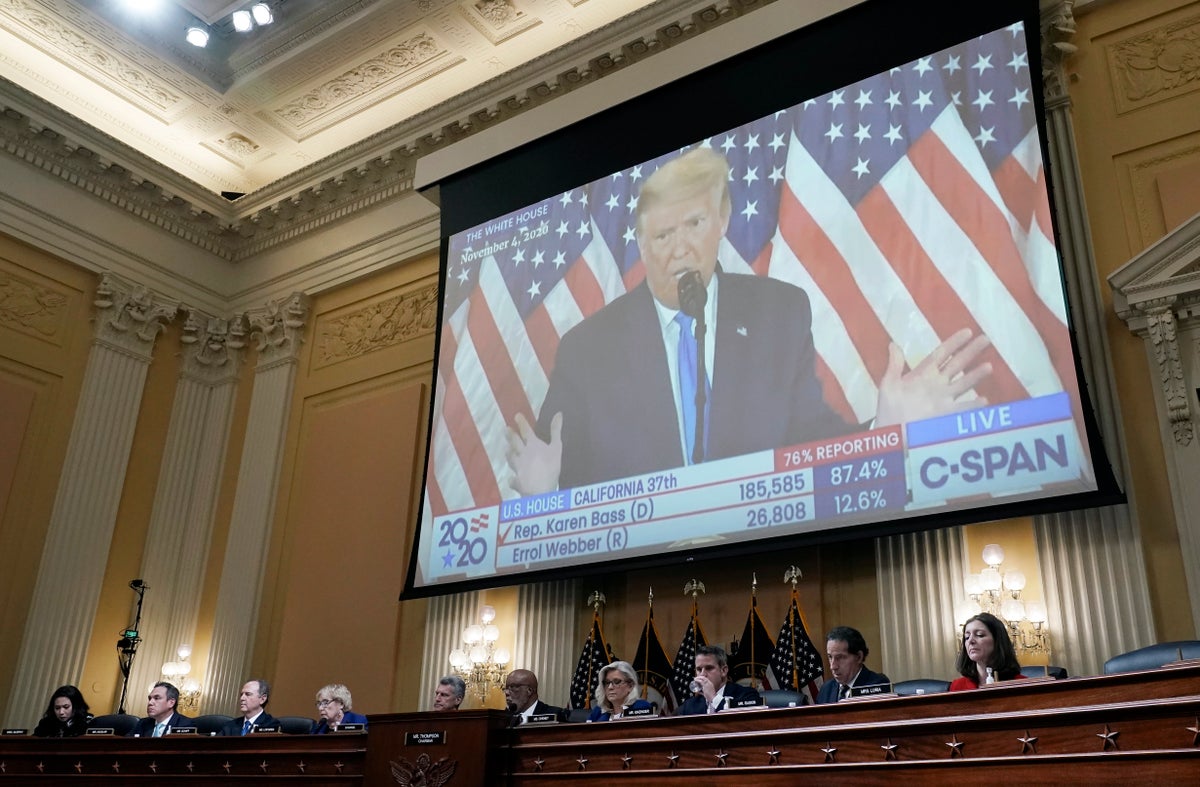
The House January 6 select committee has formally issued a subpoena to compel former president Donald Trump to produce documents by 4 November and appear to give evidence in a sworn deposition before the panel on 14 November, setting up a confrontation between the twice-impeached ex-president and the nine-member panel with just months to go before its mandate expires in January.
In a letter to the former president, select committee chairman Bennie Thompson and vice-chair Liz Cheney said the panel had “assembled overwhelming evidence” that Mr Trump “personally orchestrated and oversaw a multi-part effort to overturn the 2020 presidential election and to obstruct the peaceful transfer of power”.
Mr Thompson and Ms Cheney’s letter lays out 10 separate aspects of that effort, alleging that Mr Trump – among other things – attempted to “corrupt the Department of Justice” by “soliciting and enlisting Department officials to make false statements and aid your effort to overturn the presidential election”, “illegally pressuring state officials and legislators” to change 2020 election results, “orchestrating and overseeing” efforts to submit false electoral cerfiticates to the National Archives, and “corruptly pressuring” then vice president Mike Pence to “unilaterally refuse to count electoral votes” during the 6 January 2021 joint session of Congress.
They also allege Mr Trump filed false information “under oath, in federal court” and summoned “tens of thousands” of his followers to Washington and “sending them to march on the Capitol” with the knowledge that many were armed.
“In short, you were at the centre of the first and only effort by any US president to overturn an election and obstruct the peaceful transition of power, ultimately culminating in a bloody attack on our own Capitol and on the Congress itself,” they wrote, adding that the evidence the panel has gathered “demonstrates that you knew this activity was illegal and unconstitutional” and shows Mr Trump knew his allegations of fraud were false.
Mr Thompson and Ms Cheney said the panel had voted to subpoena the ex-president because of his “central role in each element” of the plan to overturn the election, and said committee members are seeking his testimony on communications with “multiple individuals” who’ve asserted their Fifth Amendment rights rather than testify about conversations with him, including Roger Stone, his ex-national security adviser Michael Flynn, attorneys John Eastman and Jeffrey Clark, and Arizona GOP chair Kelli Ward.
They added that they “do not take this action lightly”, but stressed that Mr Trump would not be the first ex-president to testify before either chamber of Congress under subpoena, and cited former presidents John Quincy Adams, John Tyler, Theodore Roosevelt, William Howard Taft, Herbert Hoover, Harry Truman, and Gerald Ford as examples of ex-presidents who have appeared before Congress after their time in office had come to a close.
A schedule of documents to be produced by the 4 November deadline shows the committee is still investigating whether Mr Trump or his allies may have acted to obstruct their probe or influence witness testimony.
One specific category of documents sought by the committee includes all “documents” or “communications” pertaining to contacts with “witnesses who appeared or who were or might be expected to appear before the select committee, including witnesses who served as White House staff during your administration, who served as staff for your 2020 campaign, and who served or currently serve in the United States Secret Service,” or lawyers for those witnesses.
The committee is also seeking “any communications regarding directly or indirectly paying the legal fees for any such witnesses, or finding, offering, or discussing employment for any such witnesses” as well as any communications with Tony Ornato, the US Secret Service agent turned White House deputy chief of staff who ex-White House aide Cassidy Hutchinson said told her about an altercation between Mr Trump and the head of his protective detail on the day of the riot.
The letter to the ex-president and the accompanying subpoena come just over a week after the select committee voted unanimously to compel Mr Trump to testify at the close of what is likely to be the panel’s last investigative hearing before the November midterm elections.
Speaking just before committee members voted, Ms Cheney said the panel was “obligated to seek answers directly” from the former president, who she said had “set in motion” the events leading to the worst attack on the US Capitol since British troops set fire to it in 1814.
Mr Thompson, a Mississippi Democrat who has led the panel since the House voted to establish it last year, said Mr Trump “is required to answer” to the police officers who his supporters assaulted during the riot, and to “those millions of Americans whose votes he wanted to throw out as part of his scheme to remain in power”.
If Mr Trump ultimately complies with the committee subpoena, he would be the first former president to give evidence before a congressional committee since March 1983, when former president Gerald Ford appeared at a hearing of the Senate Judiciary subcommittee on the bicentennial of the US Constitution.
The ex-president has reportedly indicated to people close to him that he might be amenable to appearing before the panel if he is permitted to do so in a live, televised hearing.
Although Mr Trump has not publicly stated whether he will comply with the investigation, he has a history of fighting tooth and nail to avoid any circumstance in which he would be made to testify under oath, under penalty of perjury.
He has also repeatedly railed against the committee’s investigation as illegitimate and derided it as a political exercise aimed at denigrating him and his supporters, most recently in a rambling four-page letter to the committee accompanied by 10 pages of false claims and grievances about the 2020 election.







